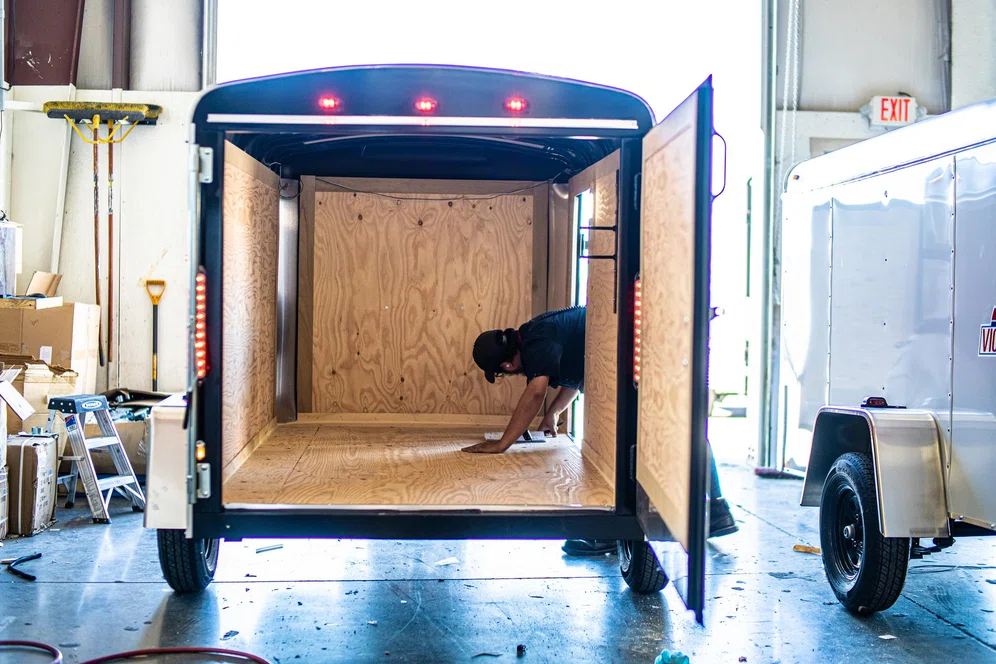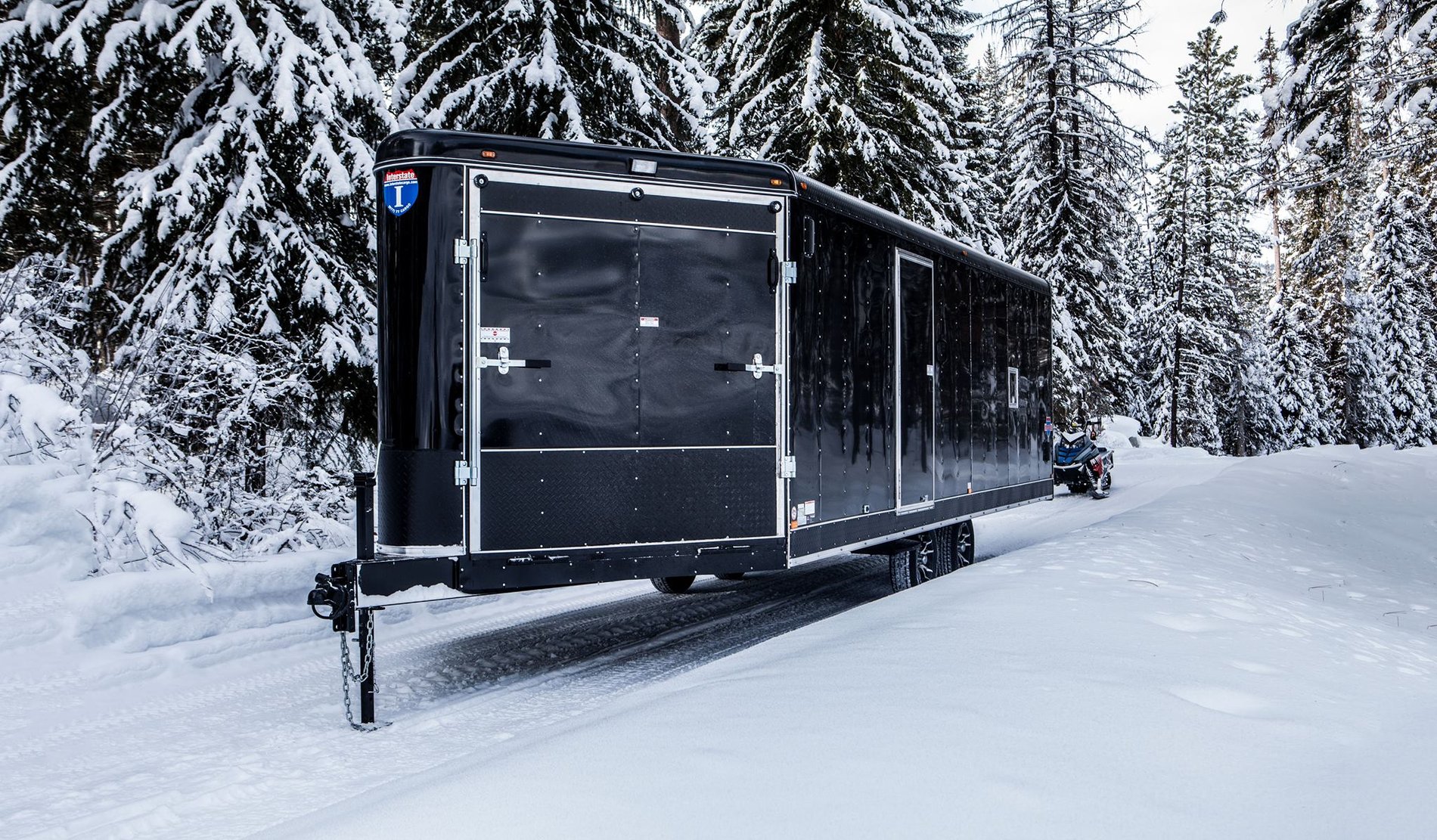Preparing your trailer for winter storage is essential to ensure its longevity and protect it from potential damage caused by harsh weather conditions. Using a proactive approach will help ensure a smooth start when it's time to hit the road again in the spring.
Clean and dry your trailer
Preparing the exterior and interior of your trailer is the first essential step to prepare for winter storage. Start by thoroughly cleaning your trailer, and removing any dirt, mud, or road grime that may have accumulated. Pay special attention to the undercarriage and wheel wells where debris tends to collect.
For cleaning tougher debris, use a mild detergent to avoid damaging the exterior finish. After cleaning, allow the trailer to dry completely. Inspect your model for any rust. Unattended cases could rapidly worsen in cold weather, even if they seem minor, and result in weakened frame integrity.
If you are preparing an enclosed cargo trailer or car hauler for storage, consider using moisture absorbers or desiccant packs in areas prone to excess humidity. This will help prevent condensation build-up, which can lead to rust and corrosion. Additionally, ensure that the interior is well-ventilated; slightly opening roof vents can promote air circulation without letting in moisture or pests.
Schedule a pre-storage service appointment
A service appointment with TrailersPlus is an excellent choice when preparing your trailer for winter storage. Our factory-certified technicians can provide a 40-point inspection to identify potential issues that could lead to long-term damage if left unattended. The weeks leading up to snowfall and significant temperature drops aren’t too late to bring in your trailer for service. Greasing your wheel bearings is a simple service we offer to avoid problems when taking your trailer out in the spring. We can also repair moderate rust spots you identified when cleaning your unit. Scheduling an appointment is convenient and can save you money in the long run.

Taking care of your battery
If your trailer has a battery, it always requires attention during winter storage. Start by disconnecting the battery from its power source to prevent any drain or electrical issues. Store the battery in a cool, dry place where it won't be exposed to extreme temperatures.
Consider using a battery tender or maintainer throughout the winter months. These devices provide a low-level charge to keep the battery alive without overcharging it. This helps maintain its overall health and ensures it will be ready for use when you're ready to hit the road again.
By protecting your trailer’s battery, you can avoid costly repairs or replacements due to freezing damage. Taking these necessary precautions will help preserve your trailer's functionality and extend its lifespan during winter storage.
Tire Care
Proper tire care is another essential priority during winter storage. Inflating the tires to match the maximum sidewall capacity can help reduce flat spots, and maintain tire shape and integrity. If possible, move the trailer periodically to transfer the trailer weight to different contact patches. Consider using tire covers to protect your tires from the elements. These covers provide an additional layer of defense against UV rays, moisture, and debris.
Regardless of how you decide to protect your tires, check them often for any signs of wear or damage. Inspect tread depth and look for cracks or bulges on the sidewalls. If any issues are identified, contact our service team for an appointment.
Storage location matters
Choosing the right storagelocation is crucial as it can significantly impact the condition of your trailer. If possible, look for a sheltered area that protects from snow, ice, and strong winds. This could include a garage, carport, or covered storage facility. By keeping your trailer shielded from the elements, you can prevent potential long-term damage. Indoor storage facilities provide maximum protection from the elements and often offer additional security features. However, they may come at a higher cost compared to other options.
Storing your trailer on concrete or another hard surface during the winter is an easy way to preserve its condition and extend its lifespan. Hard surfaces prevent standing water and moisture from accumulating under the trailer, which can cause rust and corrosion to the undercarriage and wheels. In contrast, grass or dirt areas can retain moisture and even promote the growth of mold and mildew, which can damage the trailer's structure over time. Concrete surfaces are less likely to shift or become uneven due to freeze-thaw cycles, providing stable support for the trailer's weight and preventing stress on its frame. By choosing a hard, impermeable surface for storage, you ensure that the trailer remains dry and protected from the elements, reducing the need for costly repairs and maintenance.
Evaluate the pros and cons of each parking option based on factors such as cost, convenience, accessibility, and level of protection offered. Ultimately, choose the option that best suits your needs and provides optimal protection for your trailer during winter storage.
Inspect your trailer through the winter
During the winter months, when your trailer is tucked away for storage, it's vital to conduct regular inspections to ensure it remains in top condition for spring. Snow and ice buildup on the roof is a particular concern, as the weight can strain the structure, potentially leading to warping or a collapse. Clearing off snow after each significant snowfall helps to minimize this risk. It's also wise to look for any signs of water leakage or damage after storms, as these issues can escalate if left unaddressed until the spring thaw.
In regions where heavy freezes are common, the formation of ice on the trailer can lead to a host of problems. Ice can encase moving parts, making them immobile and possibly causing damage if forced. It can also create seals around doors and windows, which upon melting could allow water to seep into the trailer. Regular de-icing is not just about maintaining immediate functionality, but also about preventing long-term moisture damage. Even though the trailer may not be in use, keeping it free of ice throughout the winter will ensure that come spring, it will be ready for the road without the need for extensive repairs or maintenance due to winter neglect.
Conclusion
Preparing your trailer for winter storage is crucial to safeguard its condition against the cold and moisture. Ensuring thorough cleaning, rust prevention, proper battery and tire maintenance are essential to avoid costly damage. Regular winter inspections, particularly post-snowfall, are vital to maintain the trailer's integrity until spring.
Schedule a service appointment with our team today to prepare your trailer for winter!
Learn more about trailer service!
Call Us Now 877-850-7587









